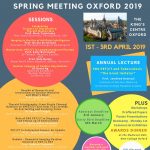

Medical races, instead of meetings, in Antiquity
The following article published about 20 years ago in the Greek journal “Eleftherotypia” is summarized below:
Medical races, instead of meetings, in Antiquity
by Dr Sevasti Haviara-Karachaliou, Opthalmologist
Professor of History A. Kouzis wrote that the virtue of competing in the form of races is an old Greek tradition.
Races aimed to improve both the physical condition of the body and the mental condition of the brain of the athletes.
In parallel with the athletic races, various other races were included in every religious ceremony. These races were musical, theatrical, dancing, reciting, poetic, rehearsal, rhapsody, painting, in order to combine the pleasure of the body and the educational pleasure of the brain.
Ancient physicians also participated in the spiritual races as was inscribed on ancient marble columns that were discovered in 1904 in Ephesus by the Austrian archaeologist Dr J. Keil. In eight of these columns it was inscribed that in the end of the 2nd and the beginning of the 3rd century AD besides the religious ceremonies, medical races also took place [1]. In Ephesus there was a spiritual institute similar to the Ptolemy II, the so-called Ptolemy Philadelphus, University in Alexandria. In this institute, which was also called Museum, groups of ancient scholars whose life project to learn and distribute knowledge were hosted. This Museum was devoted, as its name implies, to the nine Muses. The Medical Races were divided into four categories: a) surgery, b) organs, c) medical problems and d) therapeutic opinions. In the first category only surgeons participated. The speed, the technique and the final result of the operation designated the winner. The winners were awarded wreaths like all other athletes. In the category of organs the construction of useful tools was rewarded. The third category of medical problems referred to the diagnosis of diseases or the pathology of various organs.
Specific problems that the judges of the above races put to the contestants are mentioned by the medico-philosopher Kosios and by Alexander of Aphrodisias. The latter states the following: “Why fear makes people pale, why those who are ashamed blush, why those who are beaten see flames etc”.
The fourth category referred to the submission of a medical paper including treatment. In this category the major physician of Antiochia, Simeon Sith(is), was awarded the first prize for his paper “Contribution according to the elements and the power of foods” [2].
Τhe well-known physician Fikianos (2nd century AD), one of the teachers of Galen, received the first prize in Medical Races organized in Pergamos.
In the 19th century Dr George Simvoulidis tried to revive the contest for the best medical monograph [3]. After him, Professor A. Kouzis in one of his lectures praised Dr Simvoulidis who had organized these medical races for forty five years, in order to improve medical science, especially among young physicians, and honored the best achievements in medicine by awarding them a wreath and valuable prizes [4].
In our days many medical congresses and meetings are organized where physicians and specialists from pharmaceutical and technology firms present their work. It is unfortunate that in these meetings researchers are satisfied by the oral presentation and the inclusion of their papers in the archives of the meetings. It is also unfortunate that some medical equipment is often presented without sufficient application in medical practice. In these and other meetings, the papers submitted do not compete for prizes (like in ancient Greece).
Bibliography
1. Keil J, Aerjteinschriften aus Ephesos, Wien Bd YIII 1905. (in German)
2. Simeon Sith(is), “Treatise about the power of specific diets». (treatise of the 11th century AD in Greek)
3. Kouzis A, Symvoulideios Agon 1906. Medical Archives 1907. (in Greek)
Χαβιάρα – Καραχάλιου Σεβαστή, «Ιατρικοί αγώνες αντί συνεδρίων στην Αρχαιότητα», εφ. Ελευθεροτυπία, 17/9/96, σελ. 26.


